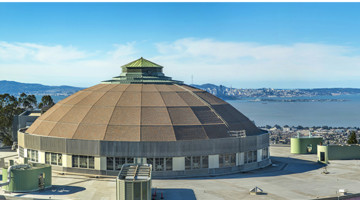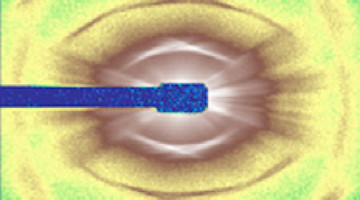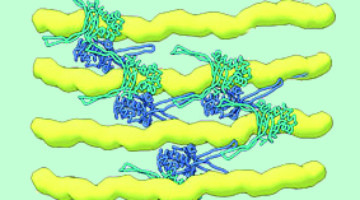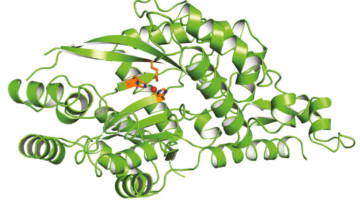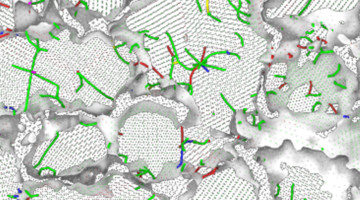An experiment born of necessity, the 2020 ALS User Meeting was held August 25–28, “in silico.” The results have been generally positive, revealing emergent benefits to interactions occurring in the virtual realm, even as we hope for a return to real space ASAP. Read more »
ALSNews Vol. 419
September 2, 2020
Toughening Mechanisms in Carp Scales at the Nanoscale
Scientists have characterized carp scales down to the nanoscale, using the ALS to watch how the fibers in the scales react as stress is applied. The resulting insights provide inspiration for the design of advanced synthetic structural materials with unprecedented toughness and penetration resistance. Read more »![]()
![]()
How Proteins Remodel DNA in Bacteria under Stress
Multiscale, multimodal visualization techniques at the ALS enabled researchers to clarify how proteins remodel bacterial DNA in response to stressful environments. The discovery could lead to new strategies for controlling microbial behavior and, eventually, new ways to fight bacterial infections. Read more »![]()
![]()
Eric Gullikson Receives 2020 Klaus Halbach Award
When Eric Gullikson first arrived at Berkeley Lab, the Advanced Light Source (ALS) did not yet exist. Thanks to his work, not only has the ALS grown in scale, capability, and renown, but other light sources worldwide have benefited as well. The ALS Users’ Executive Committee recognized Gullikson, staff scientist, for “contributions to x-ray metrology that are central to building beamlines at the ALS and around the world.” Read more »
Tom Scarvie Receives 2020 Renner User Services Award
At this year’s ALS User Meeting, Tom Scarvie, head of the ALS Operations Group, was honored with the 2020 Renner Award. The ALS Users’ Executive Committee selected Scarvie “for coordinating all accelerator and beamline floor operator activities to provide reliable light to users safely.” Read more »
Missing Lysine Link Could Improve Plant-Based Nutrition
To engineer crops with higher levels of the important amino acid, lysine, researchers solved the structure of an enzyme that helps break down lysine in plants. A fuller understanding of the factors affecting lysine levels should aid in the successful development of stable high-lysine crops to combat malnutrition globally. Read more »
Small but Still Mighty: Ultrafine Grains Produce Ultrastrong Metals
Researchers used in situ high-pressure diffraction to resolve a debate about whether a metal’s strength increases or decreases when its grain size decreases below a critical point. The results indicate that ultrastrong metals for future applications can indeed be achieved through grain-size refinement and grain-boundary engineering. Read more »
ALS in the News (August 2020)
-
-
- Aerial video: Berkeley Lab from above
- New $115 million quantum systems accelerator to pioneer quantum technologies for discovery science
- 2D electronics get an atomic tuneup
- Watching electrons harvest light at the nanoscale
- Game changer? UCSF scientists say nose spray to kill coronavirus could be available in months
- A closer look at water-splitting’s solar fuel potential
- Kristin Persson named director of Berkeley Lab’s Molecular Foundry
- MBIB management changes
-
